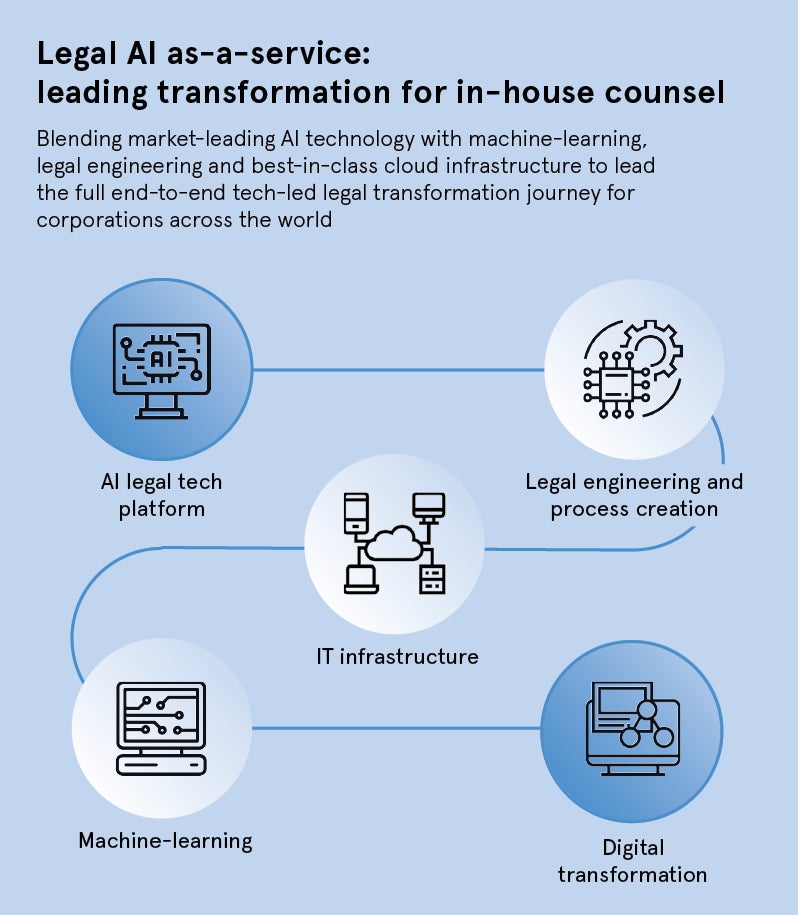 The legal technology renaissance is here, finally. The legal sector is traditionally tagged as an archaic industry that is slow to accept and adopt change. However, a generational shift in legal leadership has led to a willingness to harness the potential of technology in general and artificial intelligence (AI) in particular.
The legal technology renaissance is here, finally. The legal sector is traditionally tagged as an archaic industry that is slow to accept and adopt change. However, a generational shift in legal leadership has led to a willingness to harness the potential of technology in general and artificial intelligence (AI) in particular.
Stories of the use of legal tech, and AI specifically, among major law firms that are striving to provide their customer with true value-add experience are well documented. Less known is the growing revolution among in-house legal departments of corporations to transform their legal function digitally using AI-powered technologies.
This is no truer than for contract management where those in general counsel positions are now taking decisive leadership roles in transforming this broader business function through the use of technology.
That terrain is vastly different from where we were even six years ago when I left a career as a practising commercial lawyer to start ContractPodAi. I established the organisation as an end-to-end contract management platform “designed by lawyers, for lawyers” with built-in out-of-the-box workflows and functionality to meet the scaling demands of in-house legal teams in relation to contract management.
At that stage, the general counsel with a corporate business was, at best, an influencer in the decision-making process for procuring any legal software. Fast forward to 2018 and general counsel members are now the clear decision-makers when it comes to purchasing legal technology.
Furthermore, they have specific budgets allotted for purchasing these software and new roles, such as legal engineers and legal operations managers, are growing rampantly as the balance of power within the sector moves to stronger, more decisive in-house legal teams.
The game-changer for our success has been the addition of EV, our end-to-end AI contract analyst
Journey so far
In many ways, ContractPodAi has been a benefactor of this tectonic market change; in a short, six-year period we have evolved from an upstart to becoming one of the world’s fastest-growing legal tech providers. We have supported digital transformation projects for in-house legal teams of some of the world’s largest corporations. Within the last 12 months, we have completed more than 40 such enterprise implementations.
The game-changer for our success has been the addition of EV, our end-to-end AI contract analyst. EV is powered by IBM Watson, developed by senior commercial lawyers, and rigorously tested, using thousands of contracts’ worth of training. It can read, analyse and interpret legal language within contracts and provide the user with a near-instant summary of principal legal obligations.
AI technology automatically populates these obligations into the platform, saving lawyers hundreds of working hours in reviewing contracts and abstracting key legal information.
While our success has been overwhelmingly exciting, I am a firm believer that we have only scratched the surface within this market segment. Technology providers will need to focus on ease of use, competitive pricing and quicker implementations to drive more holistic and faster digital transformation for in-house counsel.

Key elements
I am often asked whether digital transformation is simply about buying the right software for a particular organisation. There is no question that is a most certainly a starting point and time should be taken to determine the correct tech. But while thinking about implementation, general counsel need to consider four key elements of managing implementation from both a financial budgeting and resourcing perspective.
These are the best legal tech platform; IT infrastructure, including hosting whether on-site or in the cloud; legal engineering; and machine-learning support, in the case of AI-powered solutions.
We, at ContractPodAi, differentiate ourselves from most of our competition by providing all four of these elements as part of our legal AI as-a-service fee structure, thus saving in-house counsel time and money to procure all the four elements separately.
For more information please visit www.contractpodai.com

Journey so far

